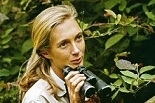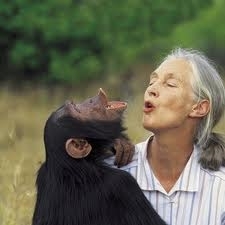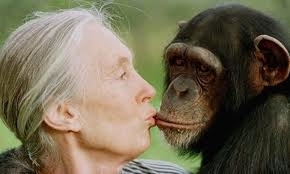"Two roads diverged in a wood and I- I took the one less traveled by, and that has made all the difference."( Robert Frost). Jane Goodall had taken the road less traveled and fortunately came to be a very successful scientist. Goodall was born in London, England, on April 3, 1934, to Mortimer Herbert Goodall, a businessperson and motor-racing enthusiast, and the former Maragaret Myfanwe Joseph, who wrote novels under the name Vanne Morris Goodall. Jane Goodall wanted to go to Africa when she was a child and many people thought that she was eccentric. When she was finished with school and she got hired as a British Secretary. Jane got an offer from her friend to go to Africa and she did. There, she met Louis Leakey and started to research about chimpanzees for him. Jane Goodall is known worldwide for her studies of the chimpanzees of the Gombe Stream Reserve in Tanzania, Africa. She is well respected within the scientific community for her ground-breaking field studies and is credited with the first recorded observation of chimps eating meat and using and making tools. Because of Goodall's discoveries, scientists have been forced to redefine the characteristics once considered as solely human traits. Goodall is now leading efforts to ensure that animals are treated humanely both in their wild habitats and in captivity. A hero must possess courage, determination, and curiosity. Heroes have to have the courage to try something that no one has ever tried or dared to do. Determination is also a must have because heroes are not people that would give up easily. Curiosity is a trait that most heroes need in order to discover something new about our world. Jane Goodall is more than just a scientist; she is an inspiration because of her initial curiosity of animals ,her determination to research apes for more than 40 years, her courage therefore she is a hero.
 |
| (http://www.time.com/) |
Scientists are made by curiosity since they are always curious about little things like what is table salt made out of or what makes up the air we breathe. During childhood, Jane was not the type of student who could sit at a desk for a whole day. Jane loved being outdoors. "When she was a young girl, Jane spent as much time outside as she could. She would explore the various creatures that made their home in her big back yard" (Weiss). Exploring the various creatures that made their home in her big back yard meant that she was curious about the animals that lived in her backyard and wanted to know more about them. She must have been curious about the habitat outside her house and find different animals that she never saw before. She even was very curious as a kid when she helped with chores in the barn at her paternal grandparent's farm. "When no adult could provide Jane with a satisfactory answer for how the eggs got there, she hid under some straw in the henhouse for four hours until an unsuspecting chicken came in and eventually plopped an egg in its nest." (Schleier). She really wanted to know how the eggs magically appeared in the henhouse so she decided to make an observation and examine how the eggs came to be. She was so curious that she had waited for four hours to know how the eggs would appear in the hen nest. Jane Goodall's curiosity led her to become a successful scientist and a successful person.
 |
| (http://www.depauw.edu/news-media/latest-news/detai ()) |
Jane Goodall, a scientist who studied apes in Africa, was determined to study them even though so many people had put her down. "Everybody thought I was crazy," Goodall remembered. "All through my childhood people said you can't go to Africa. It's the Dark Continent. You can't just go off into the bush. But my mother used to say if you really want to, there's nothing you can't do."( Schleier). Although everyone thought she was crazy, Goodall never gave up on her dream and strived for a day that it would eventually come true. Her mother gave her to support while other people were laughing and joking about her ambition to travel to Africa. One day, her dream came true. A classmate offered her the opportunity to take a position as an African secretary and it was there and then she met Louis Leakey. He took her as an apprentice to help him research chimpanzees. As she started to study the mischievous chimpanzees, "She spent long hours working to gain the trust of the chimpanzees, tracking them through the dense forests and gradually moving closer and closer to her subjects until she could sit in their midst-something which had not been achieved by her predecessors." (Encyclopedia of World Biography). She wanted to get the trust of the chimpanzees because she was so intrigued by them. She was persistent in her desire to discover new traits and characteristics of chimpanzees that other scientists have not been able to do. She was very determined to know more about chimpanzees so thus she took the courage to go to Africa and meet them in person in the jungle.
 |
| (http://www.guardian.co.uk/science/2010/jun/27/jane ()) |
Courage is needed in order to encounter and research objects or living animals that humans have never seen before. Jane Goodall had accepted Louis Leakey's offer for her to be his apprentice and was ready to explore African jungles but she had to first have some training before she was allowed to go on the adventure by herself. "In July 1960, twenty-six-year-old Jane Goodall set out for the first time for Gombe National Park in southeastern Africa to begin a study of the chimpanzees that lived in the forests along the shores of Lake Tanganyika. She had little formal training; still, she brought to her work her love of animals, a strong sense of determination, and a desire for adventure." (UXL Encyclopedia of World Biography). She was very brave to study chimpanzees in Gombe National Park without any training. Goodall stayed in forests where vulnerable to all other animals there. As she started to study the chimpanzees, she was motivated to go and examine them. "I remember so well, so vividly, as though it was yesterday - the first time, when I was going through the vegetation, the chimpanzees were still running away from me, for the most part, although some were a little bit acclimatized."(TED, March 2002). In order to look for the chimpanzees and to encounter them, you must be brave since who knows what chimpanzees can do. Chimpanzees were scared of Jane but Jane had the courage to greet them. She was very brave to do all the research because she was determined to learn more about animals and their behavior.
As Goodall said, "What you do makes a difference, and you have to decide what kind of difference you want to make." This has a huge impact on the Earth since most people live just like the quote. Determination, courage, and curiosity has turned Jane Goodall into a successful scientist and a hero. She brought to her work her love of animals, a strong sense of determination, and a desire to adventure to Africa. She never gave up when everybody said that Africa was a useless place which has no resources. One day, her friend offered her to go Africa as a secretary and she gladly accepted. Goodall met Louis Leakey who offered her a job as an apprentice and a researcher for chimpanzees. What she did possess was a passion for animals, an innate curiosity, and a powerful mentor in legendary paleontologist Dr. Louis Leakey, who decided to try to make Dr. Jane a researcher. Jane Goodall inspires me to aim for my dream and never give up on it even though everyone would laugh at me. She showed me that anything you want to do can be done. All you have to do is believe in yourself , pick yourself back up, fix your mistake, and move on. People have to be courageous and try things that they have never done or seen before. Curiosity is a major trait that most heroes have because they want to learn more about something or figure out new formulas since the Earth still has more things that needs to be studied. Jane Goodall is a fantastic scientist and hero. She not only taught us about chimpanzees but also how to strive for our dreams and get back up on the road to our goals. As Jane Goodall says, ""You cannot get through a single day without having an impact on the world around you." I want to make the world a happier and healthier place!
Page created on 1/10/2013 12:00:00 AM
Last edited 1/10/2013 12:00:00 AM
